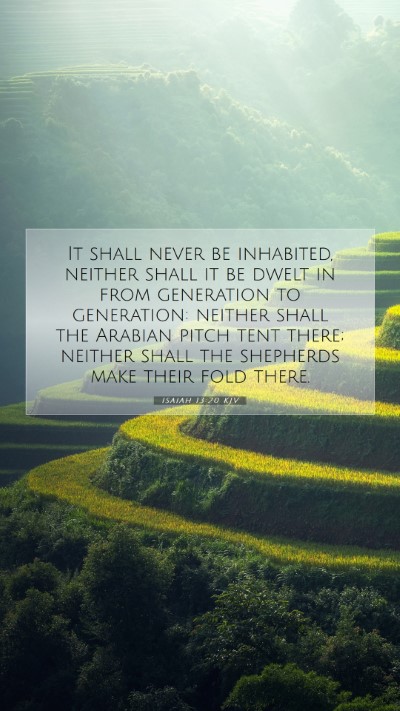Understanding Isaiah 13:20
Isaiah 13:20 states: "It shall never be inhabited, neither shall it be dwelt in from generation to generation: neither shall the Arabian pitch tent there; neither shall the shepherds make their fold there." This verse provides a vivid portrayal of the desolation that will come upon Babylon, which serves as a warning to those who rise against God and His people.
Verse Explanation
In exploring the meaning of this verse, several public domain commentaries shed light on its theological and historical significance.
Matthew Henry's Commentary
Matthew Henry emphasizes the finality of Babylon's destruction. He notes that the city, once a great power, will become completely desolate and uninhabitable. This serves as a reminder that human pride and opposition to God ultimately lead to ruin. Henry underscores the idea that God's judgments are both just and severe, demonstrating His sovereignty over nations.
Albert Barnes' Commentary
Albert Barnes highlights the stark imagery used in this passage. He affirms that Babylon will be so utterly destroyed that not even a nomad or shepherd will find a place to dwell there. This is indicative of total desolation and serves as a metaphor for the consequences of sin and rebellion against God's will. Barnes draws connections between this prophecy and the historical fall of Babylon, suggesting that God's judgments are always fulfilled according to His word.
Adam Clarke's Commentary
Adam Clarke offers a contextual understanding of this verse, pointing out the geographical and societal implications of Babylon's destruction. He discusses how this prophecy reflects God's justice against the oppressive forces of the world and serves as a warning against moral decay. Clarke posits that the lack of inhabitants represents the removal of all that once thrived in sin; thus, Babylon's fate is a lesson for generations to come.
Thematic Insights
This verse encapsulates several key themes found throughout Scripture:
- Divine Judgment: The utter desolation of Babylon serves as a testament to God's judgment upon sinful nations.
- Historical Consequences: The historical backdrop of Babylon's fall emphasizes the reality of God's prophecy and serves as a lesson for contemporary societies.
- Hope for the Righteous: In contrast to the fate of Babylon, believers are reminded of God's protection and reward for those who follow Him.
Application of Isaiah 13:20
When studying this passage, it's important to consider its application in today's context. Believers can draw lessons about the consequences of turning away from God and the importance of maintaining a heart aligned with His will. The desolation of Babylon can also lead to reflections on societal issues and moral choices faced in modern life.
Cross References
For a deeper understanding of Isaiah 13:20, consider the following cross-references:
- Revelation 18:2: Discusses the fall of Babylon as a symbol for God's ultimate judgment on sin and rebellion.
- Jeremiah 51:43: Describes the desolation of Babylon and serves as a prophetic warning against its pride and idolatry.
- Zephaniah 2:13-15: Speaks of the destruction of nations that oppose God, reinforcing the theme of divine judgment.
Conclusion
Isaiah 13:20 provides a stark warning about the consequences of sin and rebellion against God. By engaging with biblical exegesis and commentary, believers can better understand the significance of this passage for their faith and daily lives. This verse serves not only as a historical prophecy but also as a timeless reminder of God's sovereignty and justice.
Further Bible Study Resources
For those looking to explore more about this verse and others, consider using various Bible study tools such as:
- Bible study guides for in-depth analysis
- Online Bible study services that facilitate group discussions
- Courses focused on Old Testament prophecies and their meanings


